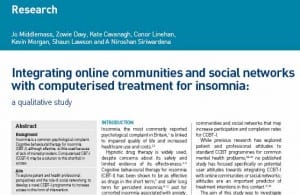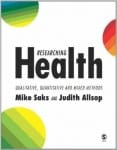A new study investigating how computerised cognitive behavioural therapy (CCBT) can be enhanced through the use of social networking platforms was published in the British Journal of General Practice in December 2012. This qualitative study, funded by the EPSRC and conducted by members of the CaHRU team, Jo Middlemass, Dr Zowie Davy and Professor Niroshan Siriwardena, explored patient and practitioner perspectives on CCBT programmes for insomnia (CCBT-I) which would included social networking.
The objectives of the interview study were:
- To explore patient and professional perspectives, attitudes, expectations and beliefs towards online health care programmes;
- To identify participants’ preferences for content, style and information disclosure to health professionals or fellow sufferers;
- To investigate barriers and facilitators of access, use and adherence to CCBT with a focus on sleep problems and insomnia.
Two meta-themes emerged as key to enhancing uptake and adherence to a potential new CCBT-I package: the need for trust (in the programme, in the patient-professional relationship and in online peer support) and the functionality of the CCBT-I package, with potential users expressing a preference for it to be interactive, individualised and easily navigable.
The findings from the interview study have been incorporated into a novel online CCBT-I package which is currently undergoing testing, designed by a team led by Professor Shaun Lawson who leads the Lincoln Institute of Social Computing (LiSC) with co-investigator Dr Conor Linehan, both based in the School of Computer Science, University of Lincoln.
The study was published in the Br J Gen Pract December 2012; 62 (605): 642-643 with the full-length article available through open access: Middlemass J, Davy Z, Cavanagh K, Linehan C, Morgan K, Lawson S, Siriwardena AN. Integrating online communities and social networks with computerised treatment for insomnia: a qualitative study of service user and primary health care professional perspectives. Br J Gen Pract 2012; 62:e840-e850 doi: 10.3399/bjgp12X659321.



